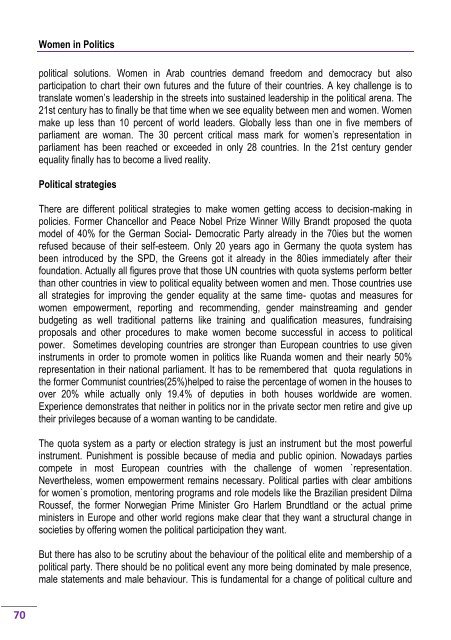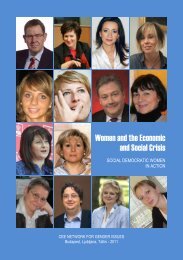Importance of women's political empowerement - Gurmai Zita
Importance of women's political empowerement - Gurmai Zita
Importance of women's political empowerement - Gurmai Zita
You also want an ePaper? Increase the reach of your titles
YUMPU automatically turns print PDFs into web optimized ePapers that Google loves.
70<br />
Women in Politics<br />
<strong>political</strong> solutions. Women in Arab countries demand freedom and democracy but also<br />
participation to chart their own futures and the future <strong>of</strong> their countries. A key challenge is to<br />
translate women’s leadership in the streets into sustained leadership in the <strong>political</strong> arena. The<br />
21st century has to finally be that time when we see equality between men and women. Women<br />
make up less than 10 percent <strong>of</strong> world leaders. Globally less than one in five members <strong>of</strong><br />
parliament are woman. The 30 percent critical mass mark for women’s representation in<br />
parliament has been reached or exceeded in only 28 countries. In the 21st century gender<br />
equality finally has to become a lived reality.<br />
Political strategies<br />
There are different <strong>political</strong> strategies to make women getting access to decision-making in<br />
policies. Former Chancellor and Peace Nobel Prize Winner Willy Brandt proposed the quota<br />
model <strong>of</strong> 40% for the German Social- Democratic Party already in the 70ies but the women<br />
refused because <strong>of</strong> their self-esteem. Only 20 years ago in Germany the quota system has<br />
been introduced by the SPD, the Greens got it already in the 80ies immediately after their<br />
foundation. Actually all figures prove that those UN countries with quota systems perform better<br />
than other countries in view to <strong>political</strong> equality between women and men. Those countries use<br />
all strategies for improving the gender equality at the same time- quotas and measures for<br />
women empowerment, reporting and recommending, gender mainstreaming and gender<br />
budgeting as well traditional patterns like training and qualification measures, fundraising<br />
proposals and other procedures to make women become successful in access to <strong>political</strong><br />
power. Sometimes developing countries are stronger than European countries to use given<br />
instruments in order to promote women in politics like Ruanda women and their nearly 50%<br />
representation in their national parliament. It has to be remembered that quota regulations in<br />
the former Communist countries(25%)helped to raise the percentage <strong>of</strong> women in the houses to<br />
over 20% while actually only 19.4% <strong>of</strong> deputies in both houses worldwide are women.<br />
Experience demonstrates that neither in politics nor in the private sector men retire and give up<br />
their privileges because <strong>of</strong> a woman wanting to be candidate.<br />
The quota system as a party or election strategy is just an instrument but the most powerful<br />
instrument. Punishment is possible because <strong>of</strong> media and public opinion. Nowadays parties<br />
compete in most European countries with the challenge <strong>of</strong> women `representation.<br />
Nevertheless, women empowerment remains necessary. Political parties with clear ambitions<br />
for women`s promotion, mentoring programs and role models like the Brazilian president Dilma<br />
Roussef, the former Norwegian Prime Minister Gro Harlem Brundtland or the actual prime<br />
ministers in Europe and other world regions make clear that they want a structural change in<br />
societies by <strong>of</strong>fering women the <strong>political</strong> participation they want.<br />
But there has also to be scrutiny about the behaviour <strong>of</strong> the <strong>political</strong> elite and membership <strong>of</strong> a<br />
<strong>political</strong> party. There should be no <strong>political</strong> event any more being dominated by male presence,<br />
male statements and male behaviour. This is fundamental for a change <strong>of</strong> <strong>political</strong> culture and



